Stories from...2020
I-STEM articles from 2020, organized in descending order chronologically.
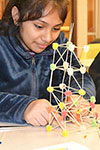 Chicago Students Experience STEM, Illinois During ChiS&E Campus Visit
Chicago Students Experience STEM, Illinois During ChiS&E Campus Visit
January 16, 2020
So excited about STEM that they put their usual Saturday morning activities on hold, a number of Chicago Public School 7th and 8th graders (and even some parents) travelled down to Illinois on December 7, 2019, for a campus visit sponsored by Grainger Engineering’s ChiS&E program. The goal was to further reinforce the youngsters’ journey along the STEM pipeline. Event planners hoped to pique the students’ interest in STEM through a variety of fun, hands-on engineering activities; introduce them both to the campus and to some of its people; and, as the name of the event—“Young Physicists and Computer Scientists”—implies, instill in them the notion that they too can achieve careers in STEM.
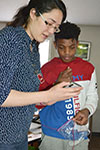 Physics' Lorenz Shines a Light on Invisible Light as Part of
I-MRSEC’s Musical Magnetism Program at Franklin
Physics' Lorenz Shines a Light on Invisible Light as Part of
I-MRSEC’s Musical Magnetism Program at Franklin
January 21, 2020
What better way to get Franklin STEAM Academy seventh and eighth grade students interested in science than by couching it in fun, hands-on activities and demonstrations and encouraging them to express what they’ve learned in some mediums they love—music, hip hop/rap, and videos. This was the goal of the Musical Magnetism program sponsored by I-MRSEC (the Illinois Materials Research Science and Engineering Center), Illinois’ NSF-funded center which focuses on some of the properties of materials, such as magnetism. The main project of the Jan 13–March 6, 2020 program is this: students are to select a specific topic related to magnetism, research it, then create a music video to be previewed at a video release party on the final day of the program.
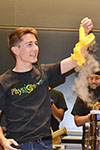 Physics Van Uses Exciting Demos to Pique Students’ Interest in Science
Physics Van Uses Exciting Demos to Pique Students’ Interest in Science
February 5, 2020
When seeking to attract youngsters to STEM and entice them into a journey along the STEM pipeline, there’s no campus group that does a better job of helping get kids moving in the right direction than the Physics Van. Playing the benevolent Pied Piper of Physics, this long-time campus group, practically the grandfather of campus STEM outreach groups, pulls out all the stops year after year, using its unique brand of fun, engaging, often spectacular demonstrations about science, particularly physics, interspersed with humorous banter bordering on slapstick comedy, to show kids just how fun and exciting science can be.
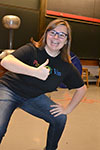 Spencer Hulsey, the Face of the Physics Van: Passionate About Physics—and Outreach
Spencer Hulsey, the Face of the Physics Van: Passionate About Physics—and Outreach
February 5, 2020
This is one of Physics senior Spencer Hulsey’s favorite quotes by physicist Richard Feynman, who helped to pique her interest in physics. However, someone who had an even more significant impact on her love of physics and decision to study it was her high school physics teacher, Steve Eischens. And while Hulsey loves physics research (she’s worked for four different professors), probably her favorite thing to do is outreach. In fact, all who have seen the co-coordinator of the Physics Department’s long-standing outreach group in action might aptly call her “the Face of the Physics Van.”
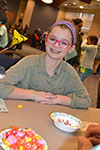 Winter Math Carnival Adds Up to a Good Time for Local Families
Winter Math Carnival Adds Up to a Good Time for Local Families
February 12, 2020
Math can be fun! This was the idea behind the Winter Math Carnival held at the Alice Campbell Alumni Center on February 2nd from 2:00–5:00 pm. It drew around 150 families and 400–500 people overall—parents, grandparents, and a whole lot of kids having a good time. Sponsored by Illinois Geometry Lab (IGL), a key research/outreach program of Illinois’ Mathematics Department, the carnival featured a variety of hands-on, math-related activities and games that encouraged the youngsters to think. Plus, in addition to some goodies, kids had a chance to interact with math students who were eager to share their passion for what they do and how much fun math can be.
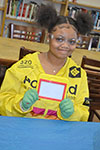 Musical Magnetism’s Destroy-A-Toy Activity: Messy, But Definitely Curiosity-Driven and Educational!
Musical Magnetism’s Destroy-A-Toy Activity: Messy, But Definitely Curiosity-Driven and Educational!
February 13, 2020
The challenge for the Franklin STEAM Academy seventh and eighth graders participating in the Musical Magnetism’s Destroy-A-Toy, hands-on activity was to discover what makes toys like a Magnadoodle or an Etch-a-Sketch work. After all was said and done, they learned that it was magnetism. (After all, in a program called Musical Magnetism, it’s apparent that either one or the other must be involved.)
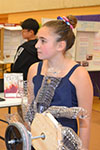 NGS Students Address Global Issues at 2020 Science and Engineering Fair
NGS Students Address Global Issues at 2020 Science and Engineering Fair
February 24, 2020
This year, for the Next Generation School (NGS) annual Science and Engineering Fair, the organizers made a slight change. Rather than students choosing to research any area as long as it was related to science or engineering, their projects were to address global issues. “We always want to keep things new and fresh for our children,” admits Head of School Chris Woller, “because we feel like that's also the world of science and engineering—new things are always popping up.”
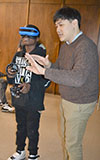 Franklin Steam Academy Students Experience Cutting-Edge Science at MRL
Franklin Steam Academy Students Experience Cutting-Edge Science at MRL
February 27, 2020
Explore a different reality via VR. Cover up from head to toe in a strange suit, safety glasses, and gloves and experience a cleanroom. See firsthand what equipment like a 3D Optical Profilometer and a Contact Angle Goniometer do. These are just some of the cool things Franklin STEAM Academy students got to experience during their field trip to the Materials Research Lab (MRL) on February 20th (the 7th graders) and 21st (the 8th graders). During their brief hiatus from the classroom, the students not only got to see, but get their hands on, some real-world, high-tech stuff MRL scientists use every day in their research.
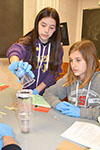 SWE’s Engineering Exploration Shows Middle School Girls: Women Can Be Engineers!
SWE’s Engineering Exploration Shows Middle School Girls: Women Can Be Engineers!
March 5, 2020
The name of SWE’s new Engineering Exploration outreach pretty much sums up the event. The 40 or so mostly middle school girls who showed up for the February 22nd all-day event had a chance to explore the different engineering disciplines available; were exposed to women in engineering—from current students to practicing engineers; and discovered, while successfully completing the various hands-on activities, that they too could do engineering.
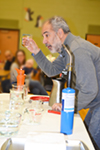 Cena y Ciencias—Science Demonstrated in Spanish by Hispanic Role Models
Cena y Ciencias—Science Demonstrated in Spanish by Hispanic Role Models
March 11, 2020
“We use language as a powerful tool to connect with the communities and provide an example for the children.” – Felipe Menanteau
Felipe Menanteau teaches the youngsters at Cena y Ciencias about heat and temperature. Felipe Menanteau teaches the youngsters at Cena y Ciencias about heat and temperature. Pizza. Exciting demos (including one featuring a blowtorch!). Hands-on activities related to temperature. These are some of the fun things a group of Kindergarten through 5th graders from two Urbana elementary schools, Dr. Preston Williams and Leal, experienced at Cena y Ciencias (Supper and Science) on March 2nd. The evening at Williams was comprised of supper (pizza) followed by, of course, science related to the night’s theme: “Put to the Test of Fire: Materials That Protect Us.” However—probably most important of all—the night’s activities were all conducted in Spanish by scientists of Hispanic heritage.
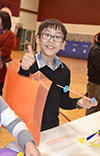 Illinois Students Introduce Youngsters to STEM Plus Art at King Elementary's STEAM Night
Illinois Students Introduce Youngsters to STEM Plus Art at King Elementary's STEAM Night
March 16, 2020
Over the last several years, the familiar acronym, STEM (science, technology, engineering, and mathematics) has improved its reach by incorporating a seemingly disparate but actually complementary discipline: Art. That’s what the recent March 5th STEAM Night at the Dr. Martin Luther King, Jr. Elementary School in Urbana was all about—exposing kids, especially minority students, to STEM via some element of art.
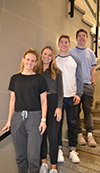 i-MADE Allows Engineering Underclassmen to Do Healthcare Design, Plus Help Others
i-MADE Allows Engineering Underclassmen to Do Healthcare Design, Plus Help Others
March 18, 2020
The new i-MADE RSO (Illinois Medical Advancements through Design and Engineering) is giving its members the best of both worlds. For instance, they’re gaining experience designing medical-field-related projects that will help them get jobs down the road. However, these projects don’t just look good on their resumes; i-MADE members are also getting the chance to make some people's lives better.
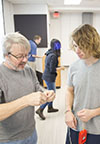 Physics Lab Reform Fosters Independent, Creative Thinking, Builds Student Skills
Physics Lab Reform Fosters Independent, Creative Thinking, Builds Student Skills
April 2, 2020
“Cause that’s a really big part of this independent, creative thinking, is to have the freedom to choose and to have the trust from your instructors that you are the expert.” – Katie Ansell
In fall 2020, the Physics Department is going to roll out reformed laboratory courses that they’ve been piloting over the last several years. But it won’t be business as usual. Instead of having students follow verbatim a long set of very detailed instructions, the idea is that the labs would foster independent, creative thinking, giving students the freedom to explore—and even fail—just like real scientists. Another goal is that the labs will help students develop two kinds of necessary skills: expertise in doing procedures plus “invisible” or involuntary skills—expertise to do something without even thinking about it. And contrary to the instructor-student hierarchy traditionally understood in years past, it’s not the instructor who will be the expert, but the students will be the acknowledged experts of the work they’ll be doing.
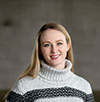 Grainger Engineering’s Knights of St. Patrick Honors Eleven Outstanding Seniors
Grainger Engineering’s Knights of St. Patrick Honors Eleven Outstanding Seniors
April 14, 2020
In spring 2020, Grainger College of Engineering’s Knights of St. Patrick honored eleven students—eight women and three men—who have exhibited leadership, character, and made exceptional contributions to the College and its students during their time at Illinois. Being inducted into the Knights of St. Patrick is one of the highest honors an Engineering student at Illinois can receive. Following are brief introductions to several of the 2020 knights themselves. As they share a few of their many accomplishments, what they loved about being at Illinois, what they’re passionate about, plus some of their hopes and dreams for the future, it is apparent why they were chosen for this prestigious honor.
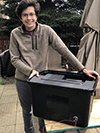 From Trash to Treasure: Liebenberg Uses Design for Repurposing to Spark Student Interest in Online Classes, Possibly Making a Difference in the COVID-19 Pandemic
From Trash to Treasure: Liebenberg Uses Design for Repurposing to Spark Student Interest in Online Classes, Possibly Making a Difference in the COVID-19 Pandemic
May 6, 2020
Can a Coca-Cola bottle be repurposed to make a medical device? What about a plastic bag? How effective are the masks we must now wear when in public? How can masks be reused safely? What are some low-cost solutions for the shortage of ventilators? Leon Liebenberg, a Teaching Associate Professor in Mechanical Science and Engineering (MechSE) was hopeful that students in his ME 270 course might answer some of these questions, even possibly resolve some of the COVID-19-related issues our society is now facing. Liebenberg says, “With everything being turned upside down” (due to the pandemic), he sought a way to help his students more fully engage in online learning. So over spring break, he revamped the final project for his Design for Manufacturability course, making it timely, extremely relevant to the real world, and sure to pique the interest of his students, whom he says are passionate about making a difference. As part of ME270’s “Design-for-Repurposing” final project, students were to design a prototype for emergency medical equipment, such as a ventilator or face mask, using repurposed materials and products..
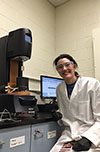 Via ISUR, Engineering Undergrads Conduct Research, Present at Virtual Expo
Via ISUR, Engineering Undergrads Conduct Research, Present at Virtual Expo
May 8, 2020
As in years past, Grainger College of Engineering’s Illinois Scholars Undergraduate Research (ISUR) Program provided support for students conducting research alongside Illinois researchers during summer 2019 and the 2019–2020 school year. However, unlike its predecessors, the virtual edition of ISUR’s Research Expo 2020, held from April 24th–May 1st lacked a crowded room full of brightly colored posters. Also missing weas the cacophony of voices simultaneously discussing research as students presented to visitors face to face. Due to COVID-19, this sort of venue was prohibited. However, just like its predecessors, the spring 2020 Expo gave undergraduate researchers a chance to share their research with interested peers, colleagues, and visitors. Each of this year’s crop of students created a poster or PowerPoint, presented their research orally, and even “stood” ready to field visitors’questions…all facilitated virtually.
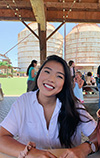 I-MRSEC’s Virtual REU to Expose Undergrads to Research, Provide Training in Needed Skills
I-MRSEC’s Virtual REU to Expose Undergrads to Research, Provide Training in Needed Skills
May 29, 2020
Eleven undergraduate students are participating in the I-MRSEC (Illinois Materials Research Science and Engineering Center) virtual REU this summer from May 27th through July 31st, 2020. However, due to the COVID-19 pandemic, the REU isn't business as usual (in-person interactions with researchers while conducting research in one of Illinois’ state-of-the-art labs). However, the students will still gain valuable experiences. They'lll still have face-to-face interactions with researchers (via Zoom?) while conducting research; they'll still be collecting and analyzing their data and presenting their results. And just like last year’s program, they will still do networking, plus gain other useful information and skills related to research and preparing for a career in STEM…all done virtually!
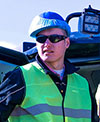 MechSE Seniors Seek to Make Congenital Amputee’s Dream of Operating Cat Heavy Equipment a Reality
MechSE Seniors Seek to Make Congenital Amputee’s Dream of Operating Cat Heavy Equipment a Reality
June 11, 2020
Ever since he was a boy, Dylan Taylor has envisioned a career behind the controls of some really big construction equipment. Now that he’s 18, he still dreams of operating some of the big boys—specifically, Caterpillar’s excavator, bulldozer, and motor grader. However, to achieve this dream, Taylor must first overcome a significant conundrum. Born with a congenital defect, he’s missing his left hand, and most of Cat’s equipment is maneuvered via dual joysticks. So a team of five Mechanical Science and Engineering (MechSE) seniors, in collaboration with Caterpillar, were excited to help Taylor achieve his dream. For their ME 470 senior capstone design project, the soon-to-be-engineers designed several machine control adaptations, which, before too long, will help to make Taylor’s dream a reality.
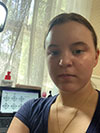 Uni High Students Experience Math Research During IGL’s Summer Program
Uni High Students Experience Math Research During IGL’s Summer Program
June 25, 2020
This year’s IGL-Uni High Summer Program was virtually the same as last year’s…except that, due to COVID-19, it was done virtually—via Zoom instead of at Altgeld Hall. The idea behind the program was to introduce students from University Laboratory High School (Uni High) to math research, with the goal of demonstrating to 21 rising freshmen, sophomores, and juniors that math research, such as that done at Illinois Geometry Lab (IGL), is quite different from the math K–12 schools do in class. Mentored by Illinois Math graduate students or post docs who are part of IGL, the high schoolers not only discovered what research is like while addressing specific areas of mathematics, but networked with math PhD students, many of whom wanted to pay it forward. Plus, they learned a bit about what being a math graduate student at Illinois is like.
 Principiae’s Jean-luc Doumont Teaches I-MRSEC Researchers How to Deliver Remote Presentations…Remotely
Principiae’s Jean-luc Doumont Teaches I-MRSEC Researchers How to Deliver Remote Presentations…Remotely
July 13, 2020
“Do what you can with what you have where you are.” “You must focus their attention where you want it to be.” “Everything you need—nothing you don’t.” “Invest time in your setup, not money in accessories.” These were some of the pithy pieces of advice shared by Principiae’s Jean-luc Doumont in a June 30th workshop sponsored by the Illinois Materials Research Science and Engineering Center (I-MRSEC). In keeping with I-MRSEC’s commitment to improve scientific communication, the topic of their latest workshop was quite timely and extremely apropos: “Delivering Your Presentation Remotely.”.
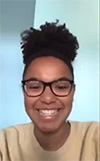 High Schoolers Discover “What It Takes” to Become Engineers During Grainger Engineering’s Summer 2020 Virtual Camp
High Schoolers Discover “What It Takes” to Become Engineers During Grainger Engineering’s Summer 2020 Virtual Camp
July 17, 2020
While Illinois’ many STEM residential summer camps were cancelled this summer due to COVID-19, the many high schoolers who had signed up prior to the pandemic, plus a few minority students who were recruited, were still able to learn about the different engineering disciplines and what being an engineer might be like via Grainger College of Engineering’s “What It Takes” Virtual Summer Camp.
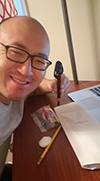 CISTEME365 Virtual Institute Equips Teachers to Expose Underserved Students to STEM Via Extracurricular STEM Clubs
CISTEME365 Virtual Institute Equips Teachers to Expose Underserved Students to STEM Via Extracurricular STEM Clubs
July 31, 2020
For five days during the period from July 20–30, CISTEME365 (Catalyzing Inclusive STEM Experiences All Year Round), a three-year, NSF-funded program in its second year, held its summer 2020 CISTEME365 Virtual Institute. Its goal? To equip educators to give students quality informal learning opportunities outside of the classroom. The idea was for teams from eight different schools to form or bolster already-existing clubs that pique the interest of under-represented students in STEM (Science, Technology, Engineering, and Math), with the long-term goal of increasing the diversity in STEM.
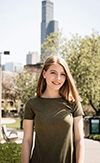 NCSA Summer Research Exposes Undergrads to Open Source Software, Possible Future Careers
NCSA Summer Research Exposes Undergrads to Open Source Software, Possible Future Careers
August 4, 2020
Exactly what is open source software? During the summer of 2020, thanks to the National Center for Supercomputing Applications (NCSA), four undergraduate students who participated in the REU INCLUSION (Incubating a New Community of Leaders Using Software, Inclusion, Innovation, Interdisciplinary and OpeN-Science) discovered just what open source software is: mostly free software whose source code is made publicly available so users can modify it to suit their needs. As part of this Research Experience for Undergraduates (REU), the students also helped to develop and contribute to some primarily open-source software projects. However, this software-in-research training experience was not just about exploring open source software and programming; students also received professional development, learned about how to present research then actually did so, plus made some relationships and networked with Computer Science researchers. In addition, a fifth student, a returnee from last year's REU INCLUSION, also conducted research as a part of NCSA’s International Research Internship.
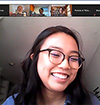 I-MRSEC’s Virtual REU Undergrads Gain Knowledge, Skills, and Insights into Their Future Careers
I-MRSEC’s Virtual REU Undergrads Gain Knowledge, Skills, and Insights into Their Future Careers
August 7, 2020
Although the COVID-19 pandemic precluded I-MRSEC (the Illinois Materials Research Science and Engineering Center) from hosting the residential REU (Research Experience for Undergraduates) intended for summer 2020–—undergraduate students physically conducting research in Illinois labs—the eleven undergrads from all across the U.S. who participated appeared to have benefitted immensely. What kind of impact did participating in the I-MRSEC REU’s virtual counterpart have on the undergrads? In addition to conducting cutting-edge research in one of Illinois’ labs—virtually—mentored by an I-MRSEC faculty member and/or a Ph.D or post-doc researcher, they presented their results at I-MRSEC's Undergraduate Symposium. Plus, students also gained other benefits from the REU: some became adept at using new software; others gained confidence; still others gained a clearer understanding of the direction they plan to go careerwise—including materials science research—all thanks to I-MRSEC’s Virtual REU.
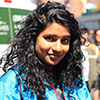 2020 Virtual Health Make-A-Thon Fosters Health Innovation
2020 Virtual Health Make-A-Thon Fosters Health Innovation
“Just the thought of maybe seeing my idea come to life and be used in the real world is surreal.” – Ariana Mizan, about her winning PillSafe Cap idea.
August 18, 2020
“Democratization of health innovation by creating a culture of innovation.” According to Irfan Ahmad, Health Maker Lab Executive Director and Carle Illinois College of Medicine (CI MED) Assistant Dean for Research, this was the goal of the 2020 Virtual Health Make-A-Thon. Held via Zoom on Saturday, August 8th, the competition narrowed the 20 finalists down to ten winners. These would shortly receive their prize—a Maker Lab coin that would entitle the bearer to $10,000-worth of services from the University of Illinois’s Health Maker Lab (HML).
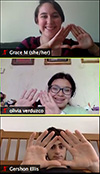 Virtual SIM Camp Assuages 8th through 12th Graders' Quarantine-Related Blues Via Fun and Intriguing Math Activities
Virtual SIM Camp Assuages 8th through 12th Graders' Quarantine-Related Blues Via Fun and Intriguing Math Activities
August 21, 2020
As with many disciplines that offer summer camps year-in, year-out on the Illinois campus, rather than not hold a camp due to COVID-19 quarantine mandates, Mathematics chose to modify the program of its established summer camp for 8th–12th grade students to hold the 2020 Virtual Summer Illinois Math (SIM) Camp. The camp ran for two separate sessions: Camp Epsilon, which hosted around 35 rising 8th–10th graders (ages 12–15) from June 8th–12th, and Camp Delta, which worked with around 25 rising 10th–12th graders (ages 15–18) from June 22nd–26th. Unlike some camps which specifically target girls, SIM Camp was open to any students who fit the age and grade criteria, regardless of gender identity.
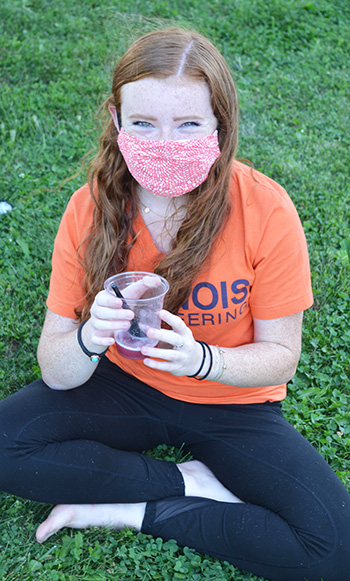 WIE Orientation: Across Many Years, Ameliorations, It’s Still the Best Ticket in Town for Fostering Connections Among Engineering Women
WIE Orientation: Across Many Years, Ameliorations, It’s Still the Best Ticket in Town for Fostering Connections Among Engineering Women
August 31, 2020
As with many disciplines that offer summer camps year-in, year-out on the Illinois campus, rather than not hold a camp due to COVID-19 quarantine mandates, Mathematics chose to modify the program of its established summer camp for 8th–12th grade students to hold the 2020 Virtual Summer Illinois Math (SIM) Camp. The camp ran for two separate sessions: Camp Epsilon, which hosted around 35 rising 8th–10th graders (ages 12–15) from June 8th–12th, and Camp Delta, which worked with around 25 rising 10th–12th graders (ages 15–18) from June 22nd–26th. Unlike some camps which specifically target girls, SIM Camp was open to any students who fit the age and grade criteria, regardless of gender identity.
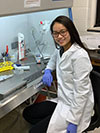 Undergraduate Women Conduct STEM Research Courtesy of Engineering’s Clare Boothe Luce Scholars Program
Undergraduate Women Conduct STEM Research Courtesy of Engineering’s Clare Boothe Luce Scholars Program
September 15, 2020
Eight undergraduate women who are committed to research and who dream of attending graduate school and possibly even pursuing careers in STEM (science, technology, engineering, and mathematics) research are discovering what it might be like courtesy of the Clare Boothe Luce (CBL) Research Scholars Program. Housed in Grainger Engineering’s Illinois Scholars Undergraduate Research (ISUR) Program, CBL provides scholarships that allow these women to experience cutting-edge research in chemistry, physics, mathematics, or engineering while being mentored by some of Illinois’ premier researchers.
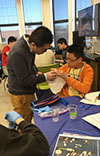 Uni High Students Get Their Hands On Soft Robotics Courtesy of Holly Golecki
Uni High Students Get Their Hands On Soft Robotics Courtesy of Holly Golecki
September 18, 2020
For several days this past February, during University Laboratory High School (Uni High) Agora Days, Uni High teacher David Bergandine and his engineering students set aside their textbooks while Bioengineering Teaching Assistant Professor Holly Golecki led them on a foray into an area she’s passionate about—soft robotics—a brand new area of study that’s creating quite a stir in the biomedical field
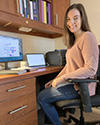 DaRin Butz Scholars Program Uses Research to Direct Engineering Undergraduate Women onto a STEM Career Trajectory
DaRin Butz Scholars Program Uses Research to Direct Engineering Undergraduate Women onto a STEM Career Trajectory
September 22, 2020
The goal of the Grainger College of Engineering’s DaRin Butz Foundation Research Scholars program is to encourage Illinois undergraduate women in engineering to pursue careers in science and engineering by immersing them in authentic research opportunities under some of Illinois’ premier researchers. The program, funded by the DaRin Butz Foundation since 2018, is under the umbrella of Grainger’s Illinois Scholars Undergraduate Research (ISUR) Program. The seven summer 2020 DaRin Butz scholars not only conducted research this past summer or during the 2020–21 academic year, but received professional development on how to present their research, then had opportunities to do so, such as in ISUR’s Fall 2020 Engineering Research Fair. Plus, the women had/are having a chance to network and through mentoring, discover what graduate school and/or careers in research might be like.
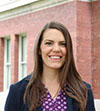 ISE’s Molly Goldstein: Passionate About Teaching Engineering Students Design
ISE’s Molly Goldstein: Passionate About Teaching Engineering Students Design
“My role is…being coach and helping students see what some of their strengths are, and what may be perceived as a weakness, and play into those so that they can play into their strengths. – Molly Hathaway Goldstein
September 30, 2020
Like many of today’s young people, when she was growing up, Molly Goldstein wanted to make a difference. Currently an Industrial and Enterprise Systems Engineering (ISE) Teaching Assistant Professor and Director of the Product Design Lab, Goldstein acknowledges, “I knew that I wanted to be in a career where I was making an impact and helping people. From my first immunization through high school, I thought that was through being a medical doctor.” While she didn’t end up being a doctor, along her journey, she discovered her real passion, and is now poised to make a difference in the lives of numerous engineering students, to help make them the best engineers possible, so they can achieve their own dreams.
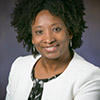 Lecture Series Highlights Women in Science at Illinois; Makes University Archives More Diverse
Lecture Series Highlights Women in Science at Illinois; Makes University Archives More Diverse
October 1, 2020
If you’re interested in innovative scientific research at Illinois and would like to find out more about the exceptional women who conduct it, sign up to attend the Women in Science Lecture Series via Zoom at noon on the second Tuesday of every month. Sponsored by the University Archives and funded by a grant from the Library Innovation Fund, the series is the brainchild of Bethany Anderson, an archivist who focuses on the history of science and technology on campus, and Kristen Allen Wilson, the coordinator of the Illinois Distributed Museum website. The new virtual lecture series was not only intended to highlight women in science at Illinois; its creators hope it, along with video records and other material which will be available via their websites, has a more lasting impact—to help diversify both Archives and Museum holdings and to provide a resource for educators. Thus, over the long-term, they hope to help increase the number of women choosing careers in STEM.
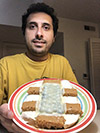 I-MRSEC’s Virtual Coffee & Cookies Hour Encourages Collegial Communication Among Researchers; Bake-Your-Research Contest Fosters Fun!
I-MRSEC’s Virtual Coffee & Cookies Hour Encourages Collegial Communication Among Researchers; Bake-Your-Research Contest Fosters Fun!
October 6, 2020
A sign of the times? To encourage collegial collaboration and facilitate socialization among researchers, yet abide by COVID-19 social distancing mandates, on Friday, October 2, from 4:30–5:30 PM, I-MRSEC (Illinois Materials Research Science and Engineering Center) held its first-ever virtual MRSEC Coffee and Cookies Hour. For the 16 or so participants hunkered down behind their computers at home (or their office) to video chat with colleagues, ostensibly, it was BYO coffee and cookies (C&C).
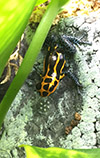 IB Professor Eva Fischer Espouses Frogs—for Both Research and the K–12 Classroom
IB Professor Eva Fischer Espouses Frogs—for Both Research and the K–12 Classroom
“We talk a lot about what we can do at the university level to increase diversity in STEM to reach other populations, etc. But I think if we don't worry about that until kids are 18 and we're at the university level, we've missed the boat. So I just think that we've got to start earlier.” — Eva Fischer
October 7, 2020
There’s a new Integrative Biology professor in town—Eva Fischer—who is sold on frogs. She’s not only setting up a lab in order to research frog behaviors, but she champions their use in the Frogger School Program she’s helped to design for K–12 classrooms.
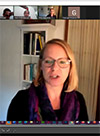 MechSE’s Amy Wagoner Johnson Teaches Grad Students How to Communicate Their Science
MechSE’s Amy Wagoner Johnson Teaches Grad Students How to Communicate Their Science
“Science isn’t finished until it’s communicated. The communication to wider audiences is part of the job of being a scientist, and so how you communicate is absolutely vital.” – Sir Mark Walport
October 12, 2020
The above assertion by Sir Mark Walport, Chief Scientific Advisor to the UK government, is a favorite quote of Mechanical Science and Engineering (MechSE) Professor Amy Jaye Wagoner Johnson's. In fact, it might be considered the philosophy behind her ME598 AWJ Science Communication course. A while back, she decided that one aspect of graduate students’ education that was sadly lacking was communicating their research—both to colleagues, fellow engineers/scientists, and to Joe Blow (or Josephine), the average citizen on the street. So she began to explore science communication, augmenting her own knowledge and skills, then passing them on to her students. Today, the Science Communication aficionado teaches her course to grateful graduate students who count it a crossroads on their journey to more effectively communicating their work.
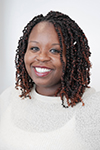 I-MRSEC Workshop Seeks to Help Researchers Improve Their Public Engagement
I-MRSEC Workshop Seeks to Help Researchers Improve Their Public Engagement
The program addresses the needs of scientists who are motivated to engage but lack the resources to develop their skills and create plans for action.” – Gemima Philippe
October 22, 2020
Intent on improving their scientific communication, particularly public engagement, 22 folks, mostly researchers from I-MRSEC (the Illinois Materials Research Science and Engineering Center) participated in the Center's Science Communication and Public Engagement Fundamentals workshop on October 16, 2020. Presented by Gemima Philippe, a Public Engagement Communication Associate from the Center for Public Engagement with Science and Technology at the AAAS (American Association for the Advancement of Science), the online workshop addressed the importance of Science Communication, then tackled key areas participants should focus on in order to improve their own.
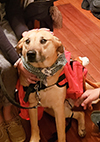 Students Experience Interdisciplinary Animal Research Via Alma’s Talking Dogs RSO
Students Experience Interdisciplinary Animal Research Via Alma’s Talking Dogs RSO
October 27, 2020
No, Alma’s Talking Dogs is not a circus act. It's actually an EOH exhibit, turned animal research project, turned RSO—probably the most uniquely named RSO on campus. But for Illinois students who are passionate about interdisciplinary research, it fills the bill, not only providing an opportunity to conduct research, but to collaborate with like-minded students across a variety of disciplines, as well as do public engagement. Plus, it enables members to get their periodic doggie fix.
.100px.jpg) Nobel Project Seeks to Pique Marginalized Students’ Interest in Computer Science
Nobel Project Seeks to Pique Marginalized Students’ Interest in Computer Science
November 9, 2020
“Really, one of the goals of the Nobel Project is to provide young people with unprecedented access to the University of Illinois—the land grant mission...If our youth are to become computer scientists, to become the next Nobel Laureate, to become sociologists—whatever it is that their gifts and talents are urging them to be—we can support them in that effort.” — Ruby Mendenhall
According to statistics, very few faculty and industry professionals in Computer Science (CS) are from marginalized populations. For instance, only around 2% of employees in CS are Black; plus, percentages from marginalized groups are also low in medicine and other STEM fields. Seeking to address this issue is STEM Illinois’ Nobel Project, headed up by Dr. Ruby Mendenhall, Assistant Dean for Diversity and Democratization of Health Innovation at the Carle Illinois College of Medicine (CI MED), and an Associate Professor in African-American Studies in the Department of Sociology. The Project’s goals over the next two years are to hold workshops and other activities designed to get young people from marginalized groups interested in CS.
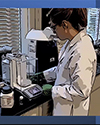 Virtual Cena y Ciencias Provides Hispanic Role Models, Encourages Hands-on “Kitchen Science”—All Done in Spanish
Virtual Cena y Ciencias Provides Hispanic Role Models, Encourages Hands-on “Kitchen Science”—All Done in Spanish
November 12, 2020
Why does holding your nose when taking medicine make it not taste as bad? What is surface tension on liquids? What do scientists do in labs? What are crystals and how do they form?
Noted above are just some of the questions I-MRSEC’s Virtual Cena y Ciencias (CyC) hopes to answer during its Spanish-language, science outreach events for local Hispanic and dual-language-program school children. But, to adhere to COVID-19 social distancing mandates, CyC, scheduled for the first Monday of the month throughout the fall 2020 and spring 2021 semesters, is being held online until further notice. Despite the change of venue, the COVID-19-friendly events, like their no-social-distancing-required predecessors, feature lectures and/or demonstrations followed by hands-on science—with a caveat. The "kitchen science" activities feature science that can be done with materials available in most homes. Plus, in addition to the exposure to science, the youngsters will experience it in Spanish, offered by Hispanic scientists who serve as role models.
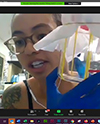 ENVISION PhD Students Use the Science of Breadmaking to Attract Franklin Eighth Graders to STEM
ENVISION PhD Students Use the Science of Breadmaking to Attract Franklin Eighth Graders to STEM
November 20, 2020
You pull a couple of slices of bread out of the bag. You slather them with peanut butter and jelly, or construct a BLT, then take a big bite. But did you ever wonder how flour is transformed from loose powder to semi-structured slices that can hold sandwich fixin’s? Exactly what is the science behind breadmaking?
During fall 2020, four Illinois engineering PhD students, Emil Annevelink, James Carpenter, Drew Kuhn, and Aleczandria Tiffany, did a Zoom outreach at Franklin STEAM Academy, a Champaign middle school whose focus is on STEAM (Science, Technology, Engineering, Arts, and Mathematics). The goal behind the October and November virtual visits was to impart the science behind breadmaking to Katie Lessaris’ eighth grade science classes. Members of ENVISION (ENgineers Volunteering In STEM EducatION), a Registered Student Organization whose sole purpose is to provide opportunities for engineering grad students to do STEM outreach, the PhD students sought to not just communicate science, but to share how they ended up in engineering, serve as role models in that they too had overcome challenges, and to foster the middle schoolers’ interest in STEM. Of course, the fact that sourdough bubbles and smells added to the fun!
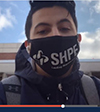 IMAGINE Family STEM Nights Strive to Interest Underrepresented Students in Engineering
IMAGINE Family STEM Nights Strive to Interest Underrepresented Students in Engineering
"Scientists in textbooks and on TV don't look like me." "No one in my family has done it." "Math is hard, and you can't do science if you're not good at math." "Only A+ students go to STEM." "The 'cool' kids don't go to STEM." "Math is for 'nerds.'" "A math degree won't pay the bills." "I don't want to work in a lab." "I'll need to go to grad school and that means a lot of student debt." "STEM degrees are more expensive." "I'll never get into X University." "I'll never get a scholarship." – Rafael Tinoco Lopez on misconceptions about STEM.
December 14, 2020
While young African-American, Latino/a, and Indigenous students might face a lot of real challenges in regards to choosing careers in STEM, according to Civil Engineering Assistant Professor Rafael Tinoco Lopez, some misconceptions concerning representation, skills, social life, future perspectives, and resources could be contributing to their not considering STEM careers. To rectify this, he and numerous other folks from both the University and the community are taking part in IMAGINE (Identifying Misconceptions of Access of Underrepresented Groups in Engineering) Family STEM Nights. Their goal? To foster inclusion of underrepresented students in engineering by helping middle grade students and their families learn more about engineering, especially specific disciplines. Plus, IMAGINE isn't just focusing on familiarizing students with what engineering is. Planners hope to address misconceptions about skills needed to be an engineer; foster discussion regarding issues of equity, access, and representation in engineering; and talk about resources available for first-time college students.
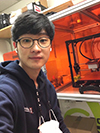 Liebenberg's ME270 Students Repurpose Products for Final Design Project
Liebenberg's ME270 Students Repurpose Products for Final Design Project
December 17, 2020
For students in Leon Liebenberg’s ME 270 (Design for Manufacturability) course, nothing could be more apropos than the old saying, “One man's trash is another man's treasure." For the final mini-project of the semester, the mostly Mechanical Science and Engineering (MechSE) students were to repurpose trash (a discarded product or products) into a product with a non-medical application. So, in an online competition held via Zoom during the final class period on December 8th, the top five projects were presented, after which classmates, the professor and his TAs, and special visitors invited to the session voted for their favorite. The treasure? The top three winners not only received accolades, but students with stellar final projects could contribute significantly to their final grade...and possibly come up with a repurposing design that could somehow make a difference down the road.
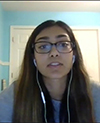 Carle Illinois Student-Centered Health Make-A-Thon Addresses Racism as a Health Crisis
Carle Illinois Student-Centered Health Make-A-Thon Addresses Racism as a Health Crisis
December 30, 2020
Racism as a Health Crisis—this was the theme of the fall 2020, student-centered Health Make-a-Thon sponsored by the Carle Illinois College of Medicine (CIMED). Coming up with innovative ideas and solutions to address this year’s theme were eight teams of CIMED students, engineering students, health care professionals, and community members. The Saturday, December 5th virtual event was held via Zoom this year due to COVID-19, with a “Dolphin” Tank comprised of CIMED, university, industry, and community experts serving as judges to determine which teams would receive the 1st, 2nd, and 3rd place awards of $5000, $3000, and $2000, respectively.













.jpg)
















